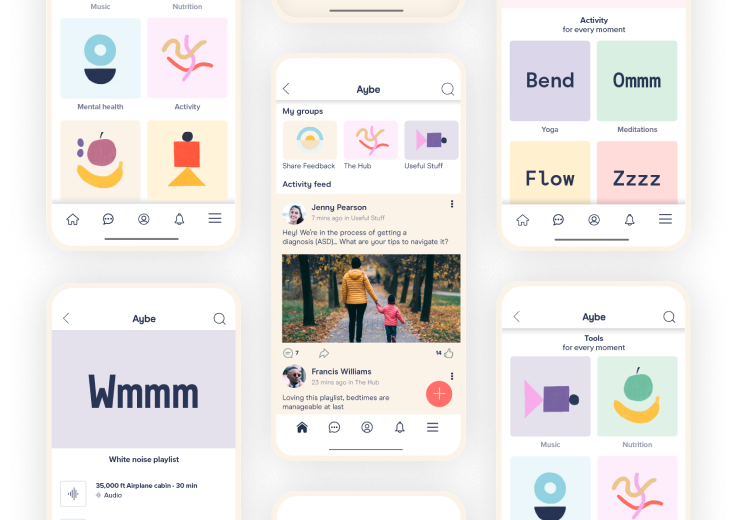ND Health: Benefits of Holistic Management

Neurodivergence impact not only how the brain works and learns, but the whole person – from mental, emotional, physical, and social self. Treating neurodivergent conditions in a holistic manner with the integrative health approach is essential. It increases the chances of finding successful interventions and adapting as needed over time.
What does Integrative Health Approach Mean?
Integrative health is an approach that works to treat the whole person by addressing symptoms while finding ways to support a broader wellness picture. As we know, many neurodiverse conditions can co-occur, so it can be helpful to consider multiple angles and treat the range of needs together so they’re all supported. In addition to using medication and conventional health approaches, things like ensuring your nutrition is right for you, taking probiotics for gut issues, or practising yoga regularly to help reduce stress can be great complements to your care plan.
Varied supports like these examples can be key in not only treating, but preventing symptoms from occurring, as they try to tackle some struggles from neurodiverse conditions at the root. An integrative health plan should look different for everyone because everyone is unique. Especially in how conditions present themselves and how we act and react to them. Make sure to look at our resources and consult with the relevant professionals to build the best plan for you!
Join the Community
Download the app to access more specialist advice, community support and wellbeing tools.
Join today as a Contributor member to gain free* access!
Download now
*Free access, in return for contributing to Aybe on a weekly basis, for example by commenting, liking, responding to feedback requests. See Terms & Conditions.

Why do Neurodiverse Conditions Benefit from Holistic Management?
Having a neurodiverse condition doesn’t just impact one facet of life, it is intertwined into every part. Sometimes that can be the physical effects like gastrointestinal issues that come with autism. ADHDers and many other Neurodivergents regularly experience sleep issues. There can be emotional and social effects that involve the people around us. Like when an individual with ADHD is in a hyperfocused period and may not respond to a prompt or question.
So we should look beyond traditional medical management for neurodiverse conditions to nutritional, physical, mental, and social supports and interventions, as well, to help people move through everyday life as a whole person supported in each aspect. Creative hobbies, practical help around the house, mental health professionals, movement, mindfulness, spending time outside in the sun and conversing with friends and family, and so many other things can all be supportive for Neurodiverse conditions and promote general wellness.
Some Practical Examples
It’s important to remember that every plan for integrative health will look different for every person. We’ve examined the benefits of holistic neurodivergent management; let’s look at specific examples and ways they could be supportive.
-
Nutrition
For ADHDers, studies have shown that different vitamins and minerals are particularly effective in helping combat symptoms, often in addition to conventional medicine. Some people find that a diet with a good balance of protein and sugars and reduced trigger foods, when combined with their medication, promote focus and alertness, and avoid heightened symptoms.
-
Movement
Exercise can be a good way to help use up excess energy and it helps the brain to balance out dopamine and norepinephrine, neurotransmitters that help regulate attention. The key is to find what you enjoy, whether it is running, dance, or karate, and stick with it. Activities can also be a way to socialise, which is beneficial for a holistic approach to health.
-
Technology
Technology built into daily routines can have a big impact. Timers can assist with better focus and time awareness for ADHDers. A watch with a schedule manager or augmentative and alternative communication (AAC) systems may help autistics in managing their routines and communicating in all areas of their lives. Access to therapists via telehealth appointments can make mental health support accessible for anxiety and other conditions.
-
Mental Wellbeing
Mindfulness has been recognised as an important treatment strategy for individuals with ADHD and other neurodiverse conditions. Meditation and mindfulness can improve attention and focus, even if you haven’t really done it before. Plus, the more consistently you do it, the benefit can add up. In fact, it’s been shown that after just 11 hours of meditation practice, we can see strengthening of the prefrontal cortex.
It is an integrative health tool that can be readily available, even if you don’t have time set aside for a full session. One example of a way to tap into mindfulness on-the-go is a short breathing exercise.
Try a box breath:
- Breathe in for the count of four
- Hold your breath for the count of four
- Breath out for the count of four
- Pause for the count of four
- Repeat as desired
Breathing exercises have been shown to lower the stress hormone cortisol and are an effective meditation technique.
A Holistic Approach for Neurodivergents is Integral to Proactive Care
The whole-person approach looks at how neurodiverse conditions affect all of one’s health and lifestyle, and vice versa. It is important to start treatment gradually and to have support — family, ADHD community, nutritionist, coach, or clinician — along the way to better wellbeing.
There are so many ways to adopt an integrative health approach for neurodivergents. What are some of your favourites?
Lookout for our insights into nutrition, mindfulness, and sleep and our tools we are developing in the pipeline to help you test out and create a holistic plan of your own. Let us know if there are any specific resources or supports you’d like to try out.
Be part of the conversation to shape our wellbeing resources and join our community.
Join the Community
Download the app to access more specialist advice, community support and wellbeing tools.
Join today as a Contributor member to gain free* access!
Download now
*Free access, in return for contributing to Aybe on a weekly basis, for example by commenting, liking, responding to feedback requests. See Terms & Conditions.





